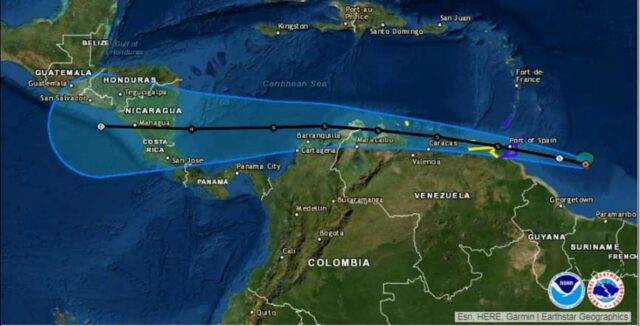Although it is true that it is unusual for meteorological phenomena such as Tropical Storm Bonnie to occur in the Caribbean in months such as June and July, this does not necessarily imply that they are caused by climate change, explained Eladio Solano, head of forecasts at the National Meteorological Institute. (IMN).

“The frequency with which the formation of a system of this nature in the Caribbean Sea occurs during the month of July is quite low,” said the meteorologist before a query made this Friday after the second press conference of the Emergency Operations Center, in which an update on the progress of the storm over the country was provided.
Solano recalled that the most recent recorded case of a tropical storm in the Caribbean at this time of year dates back to 1996. In that sense, his colleague Philip Klotzbach, from Colorado State University (United States), pointed out this Friday on Twitter that only five pre-Bonnie storms had formed in the Caribbean in July since 1950.
In 1996, Hurricane César gained strength at the end of July and crossed the Central American isthmus to later continue as a tropical storm in the Pacific Ocean, the IMN representative specified. That was nearly 30 years ago, so “it’s not such a common situation; it’s not typical of this stage of the tropical cyclone season,” he said.
It is more usual for this type of phenomenon to be seen in months like September, October and November in Central America, but “we cannot lose sight of the fact that, in reality, during the entire [rainy] season the formation of these systems is possible and therefore we have to always be aware that this possibility may arise,” Solano said.
Climate change
As to whether this situation is attributable to climate change, the meteorologist was cautious. “It seems to me that the assertion is not necessarily so correct”, because “it is a situation that we have already seen in other stages of history and that is why we do not believe that it is a situation that goes hand in hand with these changes that have been experienced “In recent decades, he detailed.
“Clearly there are also other phenomena with other situations, such as climate variability that explains the behavior of different variables in every year; climatic variables that have to do with the El Niño phenomenon or other planetary oscillations that are not generated just as fast as El Niño, but a little faster,” Solano continued.
“All these variations in the different oscillations or atmospheric and oceanic variables generate these changes that in turn can disrupt this type of circumstance like the one we are experiencing at the moment,” he concluded.

For those who have experienced shifts in consciousness and know that more peace, joy, and love awaits in a better living environment. A bold shared vision. A living community and hub for innovation. A sustainable ecosystem for living and working. A model for the new future.
